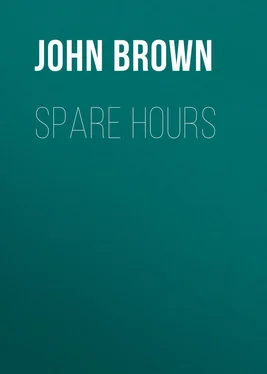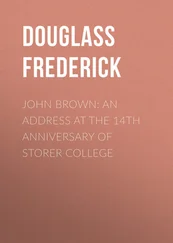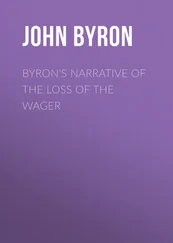John Brown - Spare Hours
Здесь есть возможность читать онлайн «John Brown - Spare Hours» — ознакомительный отрывок электронной книги совершенно бесплатно, а после прочтения отрывка купить полную версию. В некоторых случаях можно слушать аудио, скачать через торрент в формате fb2 и присутствует краткое содержание. ISBN: , Жанр: foreign_antique, foreign_prose, на английском языке. Описание произведения, (предисловие) а так же отзывы посетителей доступны на портале библиотеки ЛибКат.
- Название:Spare Hours
- Автор:
- Жанр:
- Год:неизвестен
- ISBN:http://www.gutenberg.org/ebooks/27153
- Рейтинг книги:4 / 5. Голосов: 1
-
Избранное:Добавить в избранное
- Отзывы:
-
Ваша оценка:
- 80
- 1
- 2
- 3
- 4
- 5
Spare Hours: краткое содержание, описание и аннотация
Предлагаем к чтению аннотацию, описание, краткое содержание или предисловие (зависит от того, что написал сам автор книги «Spare Hours»). Если вы не нашли необходимую информацию о книге — напишите в комментариях, мы постараемся отыскать её.
Spare Hours — читать онлайн ознакомительный отрывок
Ниже представлен текст книги, разбитый по страницам. Система сохранения места последней прочитанной страницы, позволяет с удобством читать онлайн бесплатно книгу «Spare Hours», без необходимости каждый раз заново искать на чём Вы остановились. Поставьте закладку, и сможете в любой момент перейти на страницу, на которой закончили чтение.
Интервал:
Закладка:
But one main help, we are persuaded, is to be found in studying, and by this we do not mean the mere reading, but the digging into and through, the energizing upon, and mastering such books as we have mentioned at the close of this paper. These are not, of course, the only works we would recommend to those who wish to understand thoroughly, and to make up their minds, on these great subjects as wholes; but we all know too well that our Art is long, broad, and deep, – and Time, opportunity, and our little hour, brief and uncertain, therefore, we would recommend those books as a sort of game of the mind, a mental exercise – like cricket, a gymnastic, a clearing of the eyes of their mind as with euphrasy, a strengthening their power over particulars, a getting fresh, strong views of worn out, old things, and, above all, a learning the right use of their reason, and by knowing their own ignorance and weakness, finding true knowledge and strength. Taking up a book like Arnauld, and reading a chapter of his lively, manly sense, is like throwing your manuals, and scalpels, and microscopes, and natural (most unnatural) orders out of your hand and head, and taking a game with the Grange Club, or a run to the top of Arthur Seat. Exertion quickens your pulse, expands your lungs, makes your blood warmer and redder, fills your mouth with the pure waters of relish, strengthens and supples your legs; and though on your way to the top you may encounter rocks, and baffling débris , and gusts of fierce winds rushing out upon you from behind corners, just as you will find in Arnauld, and all truly serious and honest books of the kind, difficulties and puzzles, winds of doctrine, and deceitful mists; still you are rewarded at the top by the wide view. You see, as from a tower, the end of all. You look into the perfections and relations of things. You see the clouds, the bright lights and the everlasting hills on the far horizon. You come down the hill a happier, a better, and a hungrier man, and of a better mind. But, as we said, you must eat the book, you must crush it, and cut it with your teeth and swallow it; just as you must walk up, and not be carried up the hill, much less imagine you are there, or look upon a picture of what you would see were you up, however accurately or artistically done; no – you yourself must do both.
Philosophy – the love and the possession of wisdom – is divided into two things, science or knowledge; and a habit, or power of mind. He who has got the first is not truly wise unless his mind has reduced and assimilated it, as Dr. Prout would have said, unless he appropriates and can use it for his need.
The prime qualifications of a physician may be summed up in the words Capax , Perspicax , Sagax , Efficax . Capax – there must be room to receive, and arrange, and keep knowledge; Perspicax – senses and perceptions, keen, accurate, and immediate, to bring in materials from all sensible things; Sagax – a central power of knowing what is what, and what it is worth, of choosing and rejecting, of judging; and finally, Efficax – the will and the way – the power to turn all the other three – capacity, perspicacity, sagacity, to account, in the performance of the thing in hand, and thus rendering back to the outer world, in a new and useful form, what you had received from it. These are the intellectual qualities which make up the physician, without any one of which he would be mancus , and would not deserve the name of a complete artsman, any more than proteine would be itself if any one of its four elements were amissing.
We have left ourselves no room to speak of the books we have named at the end of this paper. We recommend them all to our young readers. Arnauld’s excellent and entertaining Art of Thinking – the once famous Port-Royal Logic – is, if only one be taken, probably the best. Thomson’s little book is admirable, and is specially suited for a medical student, as its illustrations are drawn with great intelligence and exactness from chemistry and physiology. We know nothing more perfect than the analysis, at page 348, of Sir H. Davy’s beautiful experiments to account for the traces of an alkali, found when decomposing water by galvanism. It is quite exquisite, the hunt after and the unearthing of “ the residual cause .” This book has the great advantage of a clear, lively, and strong style. We can only give some short extracts.
“We may define the inductive method as the process of discovering laws and rules from facts, and causes from effects; and the deductive, as the method of deriving facts from laws, and effects from their causes.”
There is a valuable paragraph on anticipation and its uses – there is a power and desire of the mind to project itself from the known into the unknown, in the expectation of finding what it is in search of.
“This power of divination, this sagacity, which is the mother of all science, we may call anticipation. The intellect, with a dog-like instinct, will not hunt until it has found the scent. It must have some presage of the result before it will turn its energies to its attainment. The system of anatomy which has immortalized the name of Oken, is the consequence of a flash of anticipation , which glanced through his mind when he picked up, in a chance walk, the skull of a deer, bleached by the weather, and exclaimed – ‘ It is a vertebral column! ’”
“The man of science possesses principles – the man of art, not the less nobly gifted, is possessed and carried away by them. The principles which art involves , science evolves . The truths on which the success of art depends lurk in the artist’s mind in an undeveloped state, guiding his hand, stimulating his invention, balancing his judgment, but not appearing in regular propositions.” “An art (that of medicine for instance) will of course admit into its limits, everything ( and nothing else ) which can conduce to the performance of its own proper work ; it recognizes no other principles of selection.”
“He who reads a book on logic, probably thinks no better when he rises up than when he sat down, but if any of the principles there unfolded cleave to his memory, and he afterwards, perhaps unconsciously, shapes and corrects his thoughts by them, no doubt the whole powers of his reasoning receive benefit. In a word, every art, from reasoning to riding and rowing, is learned by assiduous practice, and if principles do any good, it is proportioned to the readiness with which they can be converted into rules, and the patient constancy with which they are applied in all our attempts at excellence.”
“ A man can teach names to another man, but he cannot plant in another’s mind that far higher gift – the power of naming. ”
“ Language is not only the vehicle of thought, it is a great and efficient instrument in thinking. ”
“The whole of every science may be made the subject of teaching. Not so with art ; much of it is not teachable.”
Coleridge’s profound and brilliant, but unequal, and often somewhat nebulous Essay on Method , is worth reading over, were it only as an exercitation, and to impress on the mind the meaning and value of method . Method is the road by which you reach, or hope to reach, a certain end; it is a process. It is the best direction for the search after truth. System, again, which is often confounded with it, is a mapping out, a circumscription of knowledge, either already gained, or theoretically laid down as probable. Aristotle had a system which did much good, but also much mischief. Bacon was chiefly occupied in preparing and pointing out the way – the only way – of procuring knowledge. He left to others to systematize the knowledge after it was got; but the pride and indolence of the human spirit lead it constantly to build systems on imperfect knowledge. It has the trick of filling up out of its own fancy what it has not the diligence, the humility, and the honesty, to seek in nature; whose servant, and articulate voice, it ought to be.
Читать дальшеИнтервал:
Закладка:
Похожие книги на «Spare Hours»
Представляем Вашему вниманию похожие книги на «Spare Hours» списком для выбора. Мы отобрали схожую по названию и смыслу литературу в надежде предоставить читателям больше вариантов отыскать новые, интересные, ещё непрочитанные произведения.
Обсуждение, отзывы о книге «Spare Hours» и просто собственные мнения читателей. Оставьте ваши комментарии, напишите, что Вы думаете о произведении, его смысле или главных героях. Укажите что конкретно понравилось, а что нет, и почему Вы так считаете.












